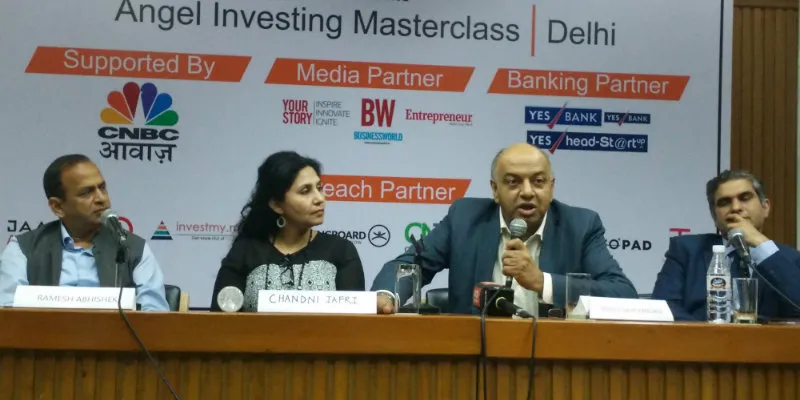Get customers’ money, and VC money will follow: Info Edge’s Sanjeev Bhikchandani
Industry stakeholders shared their insights on making the startup ecosystem more robust in the country at an event held in Delhi on Wednesday
Angel investing is a high-risk investment, with uncertain returns. According to some estimates, more than half the angel-funded companies go out of business in the first few years. And the rate to get an IPO exit stands at a disappointing 0.1 percent.

Experts say that this high failure rates has increased the need for angels to swoop in to save the day for startups.
Yesterday, Mumbai Angels held an event at IIC-Delhi and hosted various angels, startups and industry figures, essentially bringing the entire startup community together so that they could share their learning with each other.
On Wednesday evening, Chandni Jafri, CEO of Mumbai Angels, hosted a panel of Ramesh Abhishek, Secretary, DIPP; Sanjeev Bhikchandani, founder, Info Edge; and Nikhil Sahni, Group President - Government Banking & National Head - YES Bank.
When Chandni asked the panel about their contributions to the startup ecosystem, each sounded out focus on an integral part of the ecosystem.
“It’s been more than a year now of the launch of Startup India plan. The Prime Minister is very clear of the thought starups are going to be the game-changer in the future, and will be the largest creators of jobs. A year ago, we formulated various plans, including fund of funds, which needs to be done to make Startup India successful,” explained Ramesh.
Talking specifically of the distribution of funds by Small Industries Development Bank of India (Sidbo), he said that the entity has cleared sanction requests of nine funds, aggregating Rs 300 crore, which is soon to be released.
Besides, the government is also setting up incubators and tinkering labs in schools. It has also helped 14 more new states to come up with startup policies, increasing the number to 16.
He, however, added that there are so many laws that still needed change. He is in constant touch with various stakeholders to continuously improve the ecosystem for the betterment of startups and businesses.
Sanjeev of Info Edge admitted that despite all the changes by the government to bring about ease of doing business in the country, a few fundamentals related to the business hasn’t changed, and will never change. It’s still very hard to become an entrepreneur, and it needs a lot of personal sacrifice to build a company, oftentime resulting only in failure.
“I always say that funding is an enabler, and customers’ money is better than VC money. It shows the validation of the idea. If you have customers’ money, VCs money will follow,” added Sanjeev.
For the longest time, Sanjeev’s Naukri was a startup. Later, he expanded the business in other sectors. Now, he invests in startups and has invested around Rs 800 crore in 14 startups.
“And to invest in 14, we must have met over 2,000 startups. Whether we invest in startups or not, we end up giving a lot advice to them,” says Sanjeev.
Besides, he is also in the Venture Capital Investment Committee of Sidbi, where he evaluates proposals from venture capitals for startup investments.
Nikhil of Yes Bank explained the bank's partnership with the startup ecosystem goes back to the time when it introduced factor-level security solution, as well as when its first e-mail solution was provided by a startup. The bank’s association with fintech startups has been long and now to take this association forward it has also launched a fintech-focussed business accelerator programme.
He touched upon the valuation marathon that aims solely at grabbing VCs’ money. Entrepreneurs need to look at the long haul, with their goals set on profit multiplication, than becoming a 'unicorn’, based on valuation fixed by venture capitalists.






